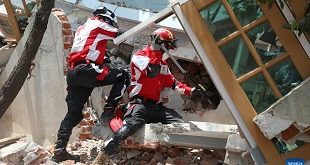
Washington, United States | AFP | As he stepped off Air Force One headed to the latest of his raucous, near-daily election rallies, Donald Trump vowed he would “absolutely” strike a different tone following the bloodshed in Pittsburgh.
Eleven members of the Pennsylvania city’s Jewish community had just been killed during morning Sabbath services, in the worst anti-Semitic attack in recent American history.
But in the same breath, the president also defended his usual tone — always provocative, often outrageous, brutally aggressive at times — as the only way to fight the media’s “lack of honesty” towards him.
The scene, Saturday at sunset at Murphysboro airport in Illinois, summed up the president’s deeply ambivalent response to a week that has shaken the country — first with a spree of mail bombs sent to leading Democrats by a Trump fan, then with a deadly anti-Semitic attack.
Striking a presidential tone, and jabbing at his opponents. Calling for unity, and lashing out. Teleprompter-Trump and Twitter-Trump.
Wednesday at the White House, as news broke of package after suspicious package being addressed to his political foes, Trump called for unity and delivered a resolute message: “Acts or threats of political violence have no place in the United States.”
Two days later, the image of a unifying president rising above the fray began to crack as he complained bitterly on Twitter that the mail bomb spree was harming his Republican Party’s “momentum” ahead of the November midterms, and appeared to cast doubt on the seriousness of the threat.
In Indianapolis on Saturday, addressing a group of young farming students just as the first horrific details were starting to emerge from Pittsburgh, Trump sought to rise to the occasion once again.
“The hate-filled poison of anti-Semitism must be condemned and confronted everywhere and anywhere it appears,” vowed the president, plainly moved by the tragedy, his posture solemn and statesmanlike.
And in a flash, he was back to campaign mode.
Minutes after announcing he had decided to go ahead after all with an evening rally despite the shooting, he cracked a joke about his hair being the cause of his hesitation.
“I was standing under the wing of Air Force One doing a news conference early this morning,” he told the gathering. “And the wind was blowing, and the rain. I said, maybe I should cancel this arrangement because I have a bad hair day.”
Before long, he was right back at attacking his potential rivals for the White House in 2020.
Taking aim at a favorite target — Elizabeth Warren, the Democratic senator who claims distant Native American ancestry — he delivered the now well-worn punchline: “Turned out that I had more Indian blood in me than she has.”
“We can’t resist,” he quipped, as the crowd lapped it up. “Can we resist?”
– ‘The irony’ –
Later that evening Trump announced he would be heading soon to Pittsburgh, in line with a long tradition of US presidents traveling to meet the families of mass shooting victims — as Barack Obama did in Newtown in December 2012 or Orlando in June 2016.
But as he stood before a sea of banners in Murphysboro, Illinois — urging him to “Finish the Wall” and “Make America Safe Again” — he was back in full swing, be it with a slightly subdued tone.
Clad in his trademark red necktie, the 45th US president hit out hard at his critics on the right — “foolish and very stupid people” — and egged on the crowd to boo Nancy Pelosi, congressional leader of the opposition Democrats.
A few days ago, David Axelrod, former advisor to Barack Obama, quoted Trump’s own words back at him: “In these times we have to unify, we have to come together.”
“True enough,” Axelrod replied to the president on Twitter. “But the irony of those words, amid the hale of incendiary rhetoric he has offered on a daily basis, is truly stunning.”
Echoing that sentiment, Jonathan Greenblatt, director of the Anti-Defamation League, a civil rights group that combats anti-Semitism in the United States — said he was encouraged by the president’s words after Pittsburgh.
“But it isn’t what you say after the tragedy that only matters. It’s the environment that you create with your rhetoric,” he added.
On Friday in the grounds of the White House, a journalist asked Trump whether he planned — as a symbolic gesture — to call his predecessor Obama, or any of the other Democratic figures targeted by the rash of mail bombs.
His answer — delivered with visible irritation: “I think we’ll probably pass.”
 The Independent Uganda: You get the Truth we Pay the Price
The Independent Uganda: You get the Truth we Pay the Price



